 23 citations,
October 2005 in “Dermatologic Surgery”
23 citations,
October 2005 in “Dermatologic Surgery” Finasteride improves surrounding scalp hair and increases hair density after hair transplant.
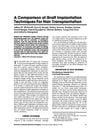 11 citations,
June 1999 in “Seminars in Cutaneous Medicine and Surgery”
11 citations,
June 1999 in “Seminars in Cutaneous Medicine and Surgery” The best hair transplant method depends on the desired look; faster techniques may not give better results or save money.
[object Object]  January 2012 in “Human health handbooks”
January 2012 in “Human health handbooks” Low-level light therapy is FDA-approved for male pattern hair loss, increases hair count and strength, and is considered safe for use.
 147 citations,
January 2014 in “American Journal of Clinical Dermatology”
147 citations,
January 2014 in “American Journal of Clinical Dermatology” Laser device increases hair density, safe for treating hair loss in men and women.
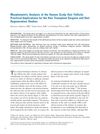 51 citations,
November 2010 in “Dermatologic Surgery”
51 citations,
November 2010 in “Dermatologic Surgery” The research provides specific measurements for hair follicles that can improve hair transplant and regeneration techniques.
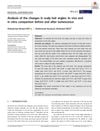 2 citations,
April 2018 in “Journal of Cosmetic Dermatology”
2 citations,
April 2018 in “Journal of Cosmetic Dermatology” Tumescent fluid increases scalp hair angles, which may improve hair transplant results and reduce surgeon fatigue.
 77 citations,
April 1999 in “Dermatologic Clinics”
77 citations,
April 1999 in “Dermatologic Clinics” The document concludes that follicular unit transplantation offers more natural results and better graft survival than older hair transplant methods.
 January 2024 in “Authorea (Authorea)”
January 2024 in “Authorea (Authorea)” New punch technologies have improved hair transplant results over time.
 31 citations,
July 2015 in “Clinical, Cosmetic and Investigational Dermatology”
31 citations,
July 2015 in “Clinical, Cosmetic and Investigational Dermatology” Hair restoration surgery effectively treats hair loss with natural-looking results, using techniques like stem cells and platelet-rich plasma.
 July 2024 in “Deleted Journal”
July 2024 in “Deleted Journal” PRP improves FUE hair transplant results.
 72 citations,
September 1997 in “Dermatologic Surgery”
72 citations,
September 1997 in “Dermatologic Surgery” Careful planning and patient counseling can lead to excellent hair transplant results, often in one or two sessions.
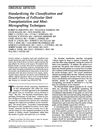 33 citations,
September 1998 in “Dermatologic Surgery”
33 citations,
September 1998 in “Dermatologic Surgery” Surgeons suggested a standard system for hair transplant methods to improve communication and results.
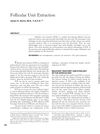 27 citations,
November 2008 in “Facial Plastic Surgery”
27 citations,
November 2008 in “Facial Plastic Surgery” Follicular Unit Extraction is a less invasive hair transplant method with potential for natural results but has challenges like longer surgery time and higher cost.
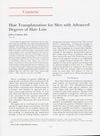 8 citations,
January 2003 in “Plastic and Reconstructive Surgery”
8 citations,
January 2003 in “Plastic and Reconstructive Surgery” Hair transplants using follicular unit grafting and a strategic design can give great results even for men with severe hair loss.
 3 citations,
June 2005 in “Ophthalmology Clinics of North America”
3 citations,
June 2005 in “Ophthalmology Clinics of North America” Follicular unit transplantation treats hair loss and restores eyebrows with short recovery and natural results.
 July 2022 in “Plastic surgery and modern techniques”
July 2022 in “Plastic surgery and modern techniques” Using stem cell-enriched fat injections before hair transplant surgery can result in less hair loss and thicker hair.
 16 citations,
February 2020 in “The Laryngoscope”
16 citations,
February 2020 in “The Laryngoscope” Hair transplants can work for frontal fibrosing alopecia and lichen planopilaris, but results are less favorable and the conditions can develop after the transplant.
 1 citations,
January 2015 in “Journal of Aesthetic & Reconstructive Surgery”
1 citations,
January 2015 in “Journal of Aesthetic & Reconstructive Surgery” Hair transplantation is the best treatment for hair loss, with new technologies improving results, and stem cell and gene therapies may treat severe baldness in the future.
 November 2024 in “Journal of Cosmetic Dermatology”
November 2024 in “Journal of Cosmetic Dermatology” PRP improves hair transplant results in androgenetic alopecia patients.
 8 citations,
January 2008 in “Journal of Cosmetic and Laser Therapy”
8 citations,
January 2008 in “Journal of Cosmetic and Laser Therapy” Hair transplantation for men has improved, offering natural, lasting results, and may be enhanced by certain medications and future technologies.
 5 citations,
September 2012 in “Dermatology Online Journal”
5 citations,
September 2012 in “Dermatology Online Journal” Follicular Unit Extraction (FUE) hair transplant is less invasive, leaves no scars, and has quicker recovery times, but it's more time-consuming and challenging. Automation helps speed up the process and improve graft survival, reducing the need for traditional strip surgery.
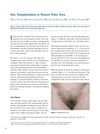 4 citations,
February 2008 in “Dermatologic Surgery”
4 citations,
February 2008 in “Dermatologic Surgery” Hair transplant surgery successfully restored a woman's pubic hair, improving her appearance and satisfaction.
 March 2021 in “Dermatological reviews”
March 2021 in “Dermatological reviews” Hair transplant works well, but needs more research for better results.
 17 citations,
October 2002 in “Dermatologic Surgery”
17 citations,
October 2002 in “Dermatologic Surgery” Successful surgical hair restoration requires careful planning, precise execution, and proper aftercare, using techniques like follicular unit transplantation and correct hair angling for best cosmetic results.
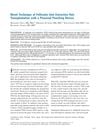 16 citations,
October 2008 in “Dermatologic Surgery”
16 citations,
October 2008 in “Dermatologic Surgery” The new powered hair transplant method is faster and damages fewer hairs than the manual method.
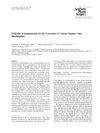 11 citations,
January 2007 in “Aesthetic Plastic Surgery”
11 citations,
January 2007 in “Aesthetic Plastic Surgery” Hair transplant is a safe and effective way to fix aesthetic issues after a facelift, with most patients happy with the results.
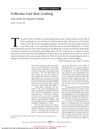 5 citations,
September 2003 in “Archives of Facial Plastic Surgery”
5 citations,
September 2003 in “Archives of Facial Plastic Surgery” Follicular-unit grafting is an effective hair transplant method that looks natural and has a high success rate.
 2 citations,
March 2021 in “Cosmetics”
2 citations,
March 2021 in “Cosmetics” Hair transplant surgery is the most effective, safe, and satisfying treatment for hair loss.
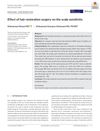 1 citations,
February 2020 in “Journal of Cosmetic Dermatology”
1 citations,
February 2020 in “Journal of Cosmetic Dermatology” Hair transplant surgery reduces scalp sensitivity by almost 40%, and smokers have less scalp sensitivity than non-smokers. The time since surgery doesn't significantly affect this.
[object Object] 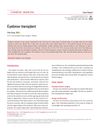 June 2020 in “Journal of cosmetic medicine”
June 2020 in “Journal of cosmetic medicine” Eyebrow transplants use hair from the scalp or pubic area, with blonde hair looking more natural, and can leave scars depending on the method used.






























